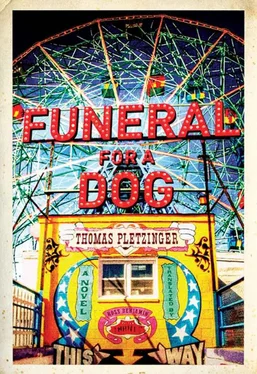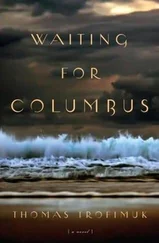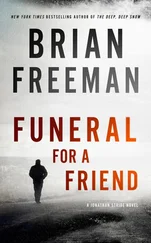phone call (straightening things out)
INTERN: Culture pages, Elisabeth Emmerich’s office, what can I do for you?
MANDELKERN: Mandelkern. I’d like to speak to my wife.
I: Who’s calling, please?
M: It’s Mandelkern.
I: Who?
M: My wife, please. Frau Emmerich?
I: Sorry, but I can barely understand you, Frau Emmerich is in a meeting at the moment. Could you try again?
M: No! DA-NI-EL MAN-DEL-KERN? Hello?
I: I really can barely understand you.
M: It’s urgent!
I: Herr Mandelkern? Where are you?
M: I’m still here.
I: Where exactly is here?
M: I’m sitting here in a café at the end of the world and have to throw up every five minutes. I have fish poisoning. Please tell that to my wife.
I: Frau Emmerich wants me to tell you that we’ve been worried. It’s been raining for days.
M: Who? We?
I: We thought you’d drowned. Frau Emmerich wants me to ask you what you’re thinking. Your phone is turned off, you’re not in the hotel. That’s fucked up, those are Frau Emmerich’s exact words. To drown without a word.
M: I ate fish. Filetto di persico. And now I’m throwing up. Tell that to my wife.
I: What’s going on with the profile?
M: There really is a story here. Several, even. Svensson has written something like an autobiography. I’m in the middle of it. I’ve taken a lot of notes. I need some more time.
I: Frau Emmerich wants me to ask you whether ethnology is getting in your way again.
M: What? No. — Maybe.
I: Herr Mandelkern?
M: I’m on death’s trail.
I: Now I can’t hear you again. The line is really bad.
M: Why did I have to be the one to come here? It’s not that simple, tell that to my wife!
I —
M: I’m going to stay longer, do you hear me? Your research was terrible, by the way! Do you hear me?
I —
M: Elisabeth?
plastic cups & imagination
It’s the creeping professionalization of our love that I can’t bear, its purposefulness. Elisabeth is a goal-directed woman, her voice sings resistance to pieces (Elisabeth and I are slipping away from each other). She took over the editorship of the culture pages, she’s 38 years old. I’d like to have your problems, Mandelkern, she said, maybe there’s a good story there. That’s what she wants (now she wants a child).
Ceresio 13:20
I’m watching the ship depart. The swallows high in the sky, the fog has dispersed. I already missed my return flight yesterday, the 13:20 ferry has just cast off with a loud blast of its horn and is crossing the lake (I can no longer leave this place today, not even if I wanted to). I will stay. My body will recover, I remember that “the ethnologist should physically work and dance, but also suffer. Stoller stresses the importance of experiences of illness and temporary paralysis” (here Spittler is referring to Stoller, The Taste of Ethnographic Things: The Senses in Anthropology ). I’ve already filled the first notebook (Semikolon, blue), the second and red notebook is lying in front of me and waiting.
How can someone really tell his own story?
I follow the waitress’s recommendation and don’t drink any more coffee (the gray chewing gum under my fingernails after I scraped it off the coin slot). She asks if I’d like Prosecco instead. Grazie , I say, grazie (everyone wants decisions). I pay. Svensson still hasn’t returned, I can no longer wait for him and Macumba (I have to finally sleep). The waitress takes my money and points along the shore to the end of the Via San Rocco and farther into the woods (the extension into nothingness). Then another kilometer. She’ll tell Svensson that I’ve already left, she says, and points to a stack of letters behind the bar, he comes every afternoon for the mail anyway. Arrivederci, scrittore, she says (apparently she means me).
with his back to the wall
High above the village, at the end of the Via San Rocco, there’s a thrown-together park bench between two dumpsters: two blocks of stone, two screwed-on planks (civilization reaches to this point). The road peters out in a gravelly dead end. Next to the dumpsters lie the same black plastic bags as on Svensson’s property. From up here Osteno is indistinguishable from the other villages on the lake (wood, stones, and ferryboats are the same color in this region, a weathered red or orange). Svensson’s ruin is somewhere down there on the water to the north, wedged between the green lake and the wooded cliff wall of Monte Cecchi. It can be reached only by a narrow road that must have been drivable at some point years ago (now Svensson’s chickens live in the Fiat, the ivy creeps over the mossy windows). Here the trees don’t have it easy, I think, but trees grow on the steepest slopes (Svensson lives with his back to the wall).
Ficus elastica
On a Sunday morning during our first summer Elisabeth and I ended up at the Hamburg fish market, the market vendors cried their wares, we ordered coffee and bratwurst, we didn’t want to stay long. Away from the stalls we fed two ducks in the oily harbor water. Our few mutual friends we’d forgotten in the Pudel Club (the red of her hair between the strings of lights). Elisabeth dispelled my caution, I peed in the entrance to a warehouse. On the Elbe a single pilot boat. When I returned, Elisabeth had bought a rubber plant ( Ficus elastica ). For us, she said, taking the flowerpot off the quay wall: now we should get out of here (the rust on the bollards). Later, in the taxi heading toward Hoheluft, she said that starting now I had to really touch her, she wasn’t made of cotton candy (Elisabeth’s tangibility).
Let’s push things forward
In the late summer Elisabeth and I grew together. When it got dark we smoked barely dried weed from our neighbor’s window box, we walked through cobblestone streets, our footsteps resounded between the buildings (Elisabeth was the only woman in the city). When the bars chained up their chairs, we lay down by the Eimsbüttel canals or next to the rose beds in the Planten un Blomen park. Elisabeth said that she wanted to see me always, and I fell asleep early in the morning only so as to wake up next to her again around noon. We bought ice cream at the twenty-four-hour gas station (Langnese, Aral), we listened to British pop music, we waited for the Hamburger Morgenpost . Most of the time we awoke in my apartment on Marthastrasse, sometimes at her place too. Once I got up and said I had to go now, sometimes it was too much. Yes, said Elisabeth, but it’s never enough (we were both right).
Are Svensson’s stories made up?
Over the lake in front of Osteno a gray haze has replaced the fog. Claasen is his own crematorium, Svensson said yesterday, but the smoke isn’t coming from the woods above Svensson’s house (Claasen’s direction). The cloud is spreading over the lake from beyond the village. This morning Svensson mentioned a quarry in Osteno, its lack of orders (Svensson makes up his stories as he pleases; I shouldn’t believe him). At the path’s entrance a sign: Attenti al Cane/Warnung vor dem Hund/Beware of the Dog.
What exactly do you actually want, Elisabeth?
Elisabeth and I on a Thursday evening in autumn on the way to the Literaturhaus on the Outer Alster Lake, we were supposed to meet her still-husband. I’d like to introduce Mandelkern to you, Elisabeth had said on the phone, Mandelkern makes my everyday life easier (I stood next to her and felt like a teenager). Elisabeth had already been living alone for years, she was still married only on paper. There was still some time and it was a clear evening, so we got out of the taxi on Schöne Aussicht, we wanted to walk the last stretch. When I asked why this meeting was necessary, Elisabeth pulled me into a rhododendron by the Wolfgang Borchert memorial. We’re reasonable people, said Elisabeth, clamping my head in her hands (vise). Take your finger, Mandelkern, she said, I want you to mark my pussy (words fail me). But she showed consideration for the people out for a stroll and came only softly or not at all, We are the generation without ties and without depth was engraved on the Borchert stone, a large dog crawled to us in the undergrowth and was whistled back (different generation, different abyss). Elisabeth believed in clear boundaries and was about to set one. Wash your finger, said Elisabeth, he doesn’t have to smell us right away. What exactly do you actually want? I asked. Elisabeth’s reply: I want to sense where I belong (we once belonged to each other, I remember). Later we were sitting at one of the back tables in the large hall of the Literaturhaus Café, when Elisabeth’s husband canceled our meeting. Not much later he went into retirement, the divorce they settled the next spring, I never met him.
Читать дальше












